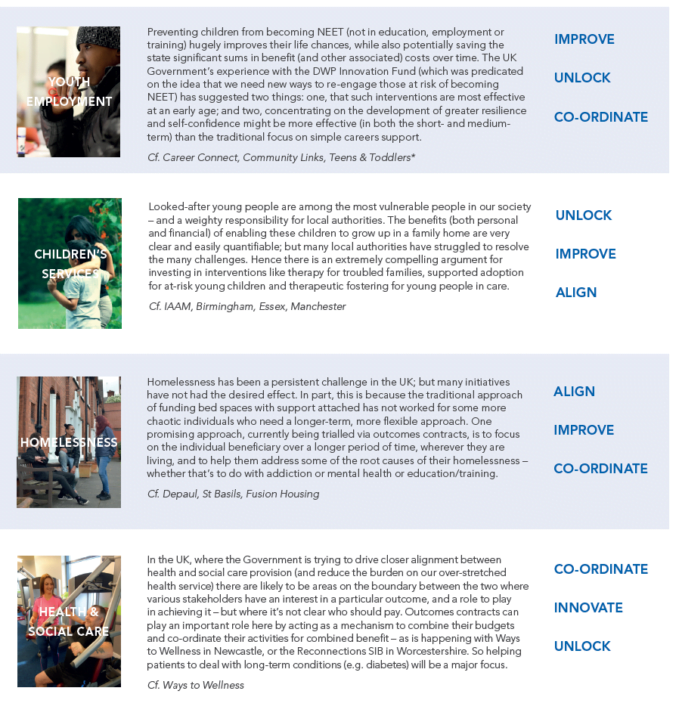Better Outcomes, Better Value
As regular readers will know, the British Government sees itself as the originator of Social Impact Bonds and has set itself the target of a £1billion SIB market by 2020.
SIBs are seen as a key way of leveraging private and philanthropic funding into public services and there is a dedicated unit at the Cabinet Office to drive the concept forward.
So, a recent (22 April 2016) report: Better Outcomes, Better Value: The evolution of Social Impact Bonds in the UK is timely to say the least.
The report is produced by Bridges Ventures and should be read in the understanding that the organisation is a specialist fund managed focused on sustainable and impact invest which has a vested interest in the success of SIBs.
The growth of SIBs
The growth of outcomes-based commissioning, most commonly known as payment by results, in the UK has been substantial with over £15bn worth of public PbR contracts between 2010-2015. The graphic below, reproduced from the report, shows that £100 million of this total has been funded via SIBs (shown in blue):

Key policy areas
The report identifies four policy areas where PbR schemes might be particularly effective:
- Youth Employment
- Children’s Services
- Homelessness
- Health and social care
Their rationale is summarised in the graphic below:

The evolution of the SIB model
Bridges Ventures identify three main ways in which they contend that the SIB model has evolved in the UK; which are discussed in turn briefly below.
Quicker development
The early UK SIBs were initiated and managed by intermediaries who supported Government and providers throughout the design and execution process. This approach will continue to be useful for any market developing a SIB for the first time.
Inevitably, these early SIBs took a long time to develop, were complex in structure, and incurred a range of transaction costs. However, the pioneering work done in creating new standards and upskilling the key parties is now bearing fruit.
Bridges Ventures says this is no longer the case, citing examples from PbR initiatives they have been involved in. For the Department for Work & Pensions’ Youth Engagement Fund, the commissioner was able to get from initial design to programme launch much more quickly than for the Innovation Fund. Similarly, as providers are given more freedom to constantly evolve their delivery, they are finding new ways to deliver better outcomes at lower cost.
For example, Career Connect made substantial adjustments to its programme during its first outcomes contract; this enabled it to submit a bid based on a proven model second time around, increasing value-for-money to Government.
As commissioners and providers gain a richer understanding of how to design and deliver outcomes contracts well, it is fostering greater confidence on both sides, which, Bridges Ventures claim, makes the role of intermediary less central.
Broader application
Many early SIBs focused on untested new interventions; indeed their main prupose was to stimulate innovative ways of tackling entrenched social problems. Of course this meant that these PbR schemes had to be designed without an existing baseline in terms of price or performance – SIBs
of this kind tend to be small-scale, with payment mechanisms based on a complex control group.
Although Bridges Ventures agree that PbR schemes − and therefore SIBs – will continue to be a powerful tool for innovation, they argue that there is also a substantial opportunity in improving existing services; i.e. in helping commissioners achieve better value in situations where they already have a targeted spend.
In these situations, rather than expending substantial amounts of time and money identifying and tracking a control group, commissioners can base their contracts on existing performance baselines.
Better relative value
Bridges Ventures quite reasonably argue that PbR contracts will only become the norm if they allow commissioners to achieve better, more or cheaper outcomes than alternative approaches.
Conclusion
Like Bridges Ventures, I see considerable potential in PbR contracts and the potential for social investment generally and Social Impact Bonds in particular to drive their development.
However, my recent work in this area, suggests that we need a much more detailed understanding of how PbR works in practice to ensure that it is an effective model.
Many current large scale government PbR schemes (such as the Work Programme and new private probation contracts known as Transforming Rehabilitation) try to achieve more AND better AND cheaper outcomes at the same time.
While they have been used within much reduced budgets, it is far from clear that they will actually deliver more or better outcomes.







